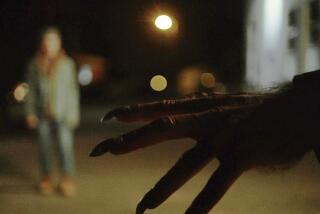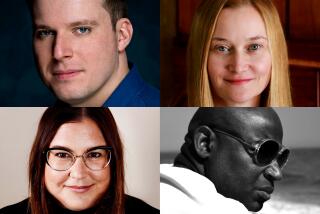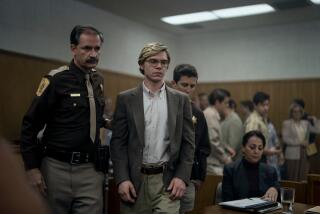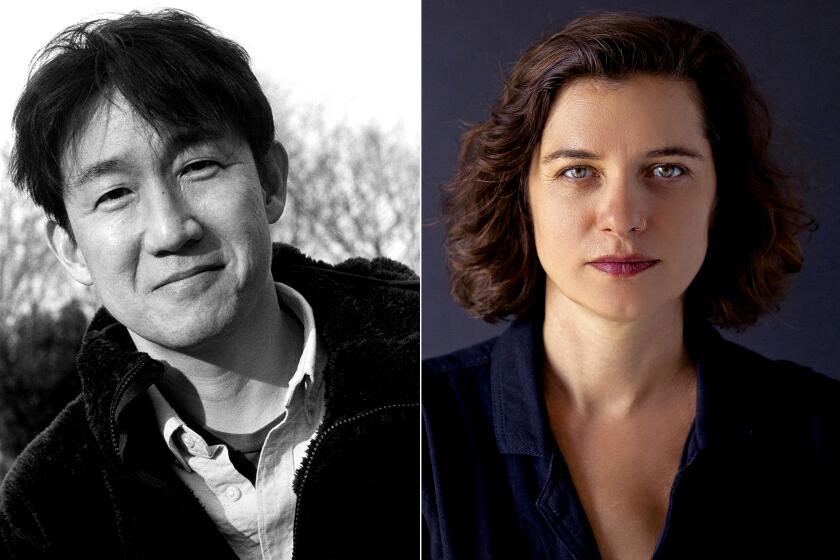Shooter Jennings and Stephen King team for ‘Black Ribbons’
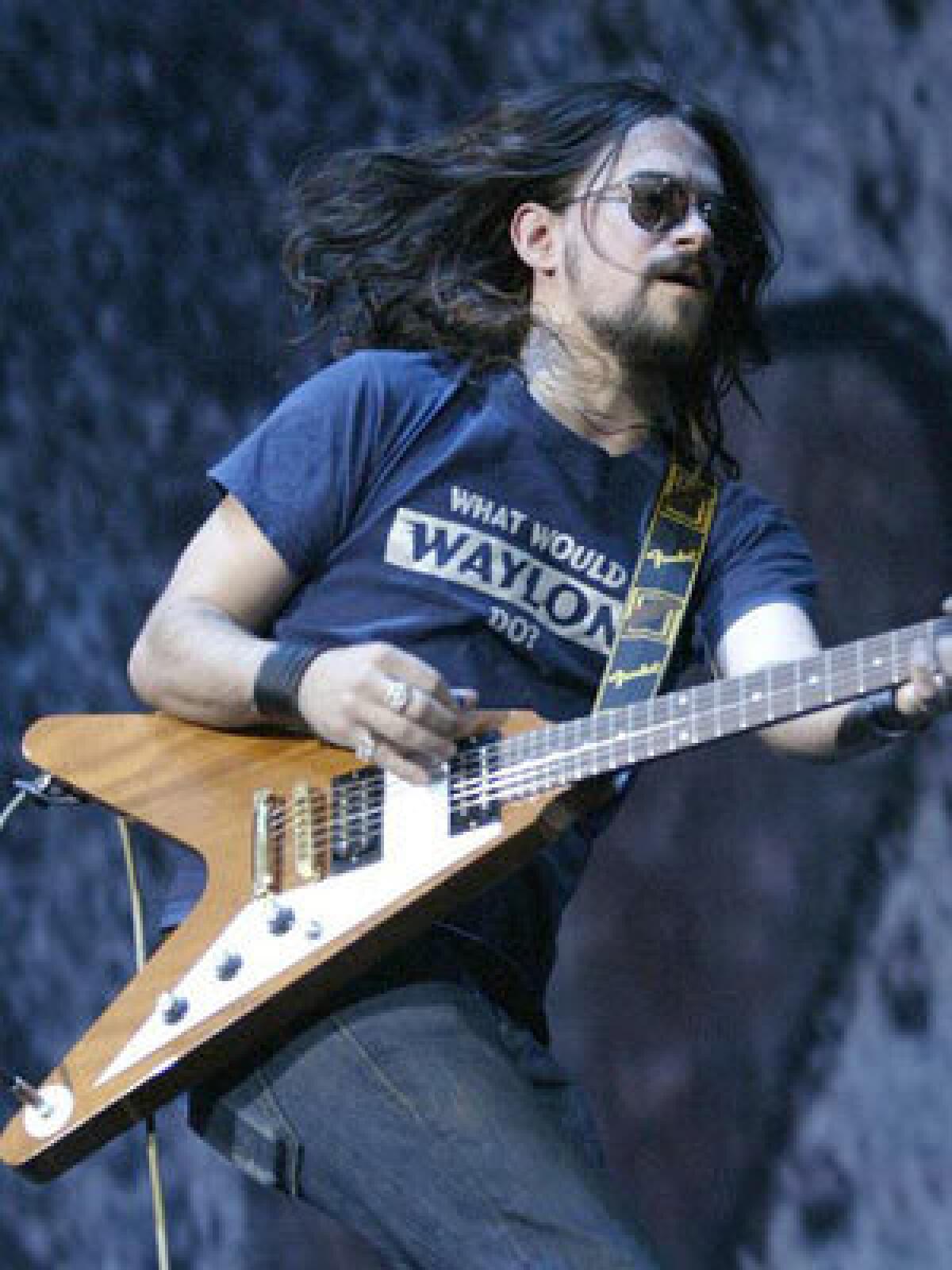
The world that Shooter Jennings has created in his ambitious new album, “Black Ribbons,” is more ominous than brave and more nerve-rackingly familiar than new in presenting a scenario of the dark days ahead for humankind in the tradition of Aldous Huxley’s classic 1932 novel.
Yet the singer and songwriter, the maverick offspring of country music outlaws Waylon Jennings and Jessi Colter, is putting his message across in myriad ways that Huxley wouldn’t even have imagined in his treatise about a technological society in which there’s little room for human connection.
It’s an intriguing project -- one with a major guest role for horrormeister Stephen King as the acerbic narrator of a fanciful tale about the erosion of individual freedoms in the Internet Age. Jennings has made it by fully embracing the new avenues of expression the Internet has created.
For Jennings, who spent the last decade pushing at the boundaries of contemporary country music, it constitutes a dramatic departure from his country roots that finds him turning his back on the Nashville music establishment much like his father did three decades before him.
“When I started doing this record, I was in a place where I had left my label, left my management I had down there in Nashville, and felt like I was at rock bottom,” Jennings, 30, said in the studio of the hilltop home above West Hollywood he shares with his fiancée, actress Drea De Matteo, and their 2-year-old daughter, Alabama. “I was feeling pretty voiceless, and depressed. . . . At this point I’m thinking no one’s going to buy my records anyway, and I just wanted to do something that was really fun and different and exciting.”
“Black Ribbons” was born, inspired during a cross-country RV trip with his family.
“I was driving the whole way,” he said. “We were in the middle of nowhere, and every night about midnight I’d hear these programs: everything that was on coast-to-coast stations to local radio -- whatever we could get on the AM dial we had. It was all this really scary talk about the ballooning police state, the globalization agendas and whatnot.
“Here I was with my family in the middle of America in this RV, and it was so beautiful to be with them, but everything outside the RV was scary and unknown,” said Jennings, looking through mirrored aviator sunglasses like those his father favored, his dark hair falling past his shoulders and scraggly beard telegraphing the image of a Southern rocker. Although his albums with his hard-edged alt-country band the .357s tested the boundaries of mainstream tastes, “Black Ribbons” has bypassed those limits entirely, crafting a darkly atmospheric rock concept album about the last voice of true freedom in the land, a freewheeling late-night talk-show DJ called Will O’ the Wisp, voiced by King.
Fans of Pink Floyd’s “The Wall,” Roger Waters’ “Radio KAOS” and Nine Inch Nails’ “The Downward Spiral” will likely be empathetic to Jennings’ album, with its searing extended guitar solos, spacey synthesizer textures and frequent bone-rattling hard-rock rhythms.
The effect of “Black Ribbons” is heightened considerably by King’s droll, seemingly off-the-cuff riffs, full of righteous indignation and underlying humor as he rails against mounting government oppression and champions the importance of the voice of the individual to counter it. The album’s conceit is that Will O’ the Wisp is about to be shut down by the forces of conformity; he’s making his last stand playing music by Hierophant, the fictional name Jennings has given the .357s for this project.
“It’s a tremendously spooky idea,” King, who had admired the .357s music he’d heard, said in a separate interview about his reasons for volunteering his services. “He sent me a draft, and it was just about perfect. I altered a few things and expanded some of it, but he knew exactly what he wanted. . . . To me, it was brilliant, the way the talk and the music weave in and out. I haven’t heard the final version, but I heard a rough mix I thought was pretty good, even though I’m not in love with the sound of my own voice.”
Not only hasn’t King heard the finished version of the album, he and Jennings have never met, nor spoken by telephone. Jennings, a longtime fan of King’s writing, originally reached out to the author by e-mail, which is how their whole collaboration was conducted. King recorded his bits at a studio in Florida and sent the digital files back to Jennings, who inserted them into the music he’d crafted at his home and at album producer Dave Cobb’s home studio in Silver Lake.
Jennings is sincere about the subjects he addresses in “Black Ribbons,” but he’s also clearly having fun translating them into a role-playing video game he’s created for his website and interactive features that let listeners remix or add to his versions of the songs. He’s also going on tour in April.
“We’re trying to bring people into this in as many ways as possible,” he said. “It’s almost like it’s the best time for art right now but the worst time for commerce. . . . When you’re broke, making money appear during an economic crisis is very hard.”
Jennings will soon find out whether anyone will buy “Black Ribbons.” But creating a hit wasn’t the point.
“Ultimately,” he said, “it was really pure and inspiration-driven, like if nothing ever happens with it, we know we’ve done something that we like.”
More to Read
The biggest entertainment stories
Get our big stories about Hollywood, film, television, music, arts, culture and more right in your inbox as soon as they publish.
You may occasionally receive promotional content from the Los Angeles Times.
